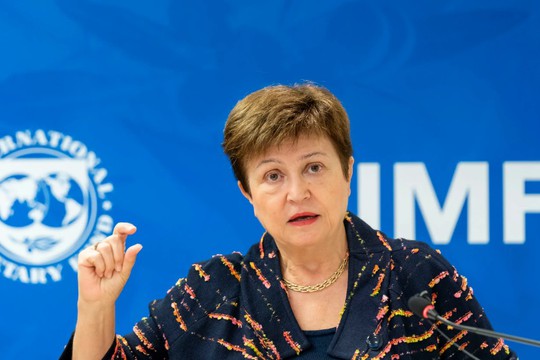IMF Managing Director Kristalina Georgieva.
Photo: Brookings.edu
The International Monetary Fund (IMF) indefinitely postponed its planned visit to Russia, according to Russian state-run media, POLITICO informs.
An IMF delegation was scheduled to travel soon to Russia for the first time since February 2022, sparking criticism from several EU governments and warnings the trip would be used by the Kremlin as propaganda. The IMF defended the visit to Russia, one of the organization’s 190 members, saying it was a treaty obligation.
Aleksei Mozhin, Russia’s director at the IMF, told state-run TASS that the IMF had notified Russia on Monday — the same day virtual discussions were scheduled to begin ahead of the in-person visit — “that the mission’s work would be postponed indefinitely.” The reason given was “technical unreadiness of the mission to hold consultations," he said.
Two officials told POLITICO earlier this month that the IMF had suggested holding the meeting in a third country, but eventually accepted the Kremlin’s condition that the mission must travel to Russia.
Earlier this month, the IMF announced plans to conduct an annual review of Russia’s economy. In order to do that, the agency will start virtual discussions with Russian authorities on economic issues on September 16, and send its staff to the country for in-person consultations shortly after that.
The announcement attracted attention from Kiev’s Western backers, as this would be the first time the US-based institution engaged with Russia since the start of the Ukraine conflict. In a letter reportedly seen by POLITICO, the finance ministers of Lithuania, Estonia, Latvia, Sweden, Finland, Denmark, Norway, Iceland and Poland claimed that the agency would be sending the wrong message to the global community if it goes through with its plan.
The authors of the letter reportedly alleged that IMF visits to Russia “will undoubtedly be used for propaganda purposes by the Russian regime,” and warned the agency of “substantial reputational risks” if it resumes work with the sanctioned country.
Commenting on the situation at a press briefing on Thursday, IMF spokeswoman Julie Kozack said the annual economic reviews, also known as Article IV consultations, was part of “a mutual obligation” between the fund and its members, recorded in the IMF articles of agreement.
Kozack signaled that the absence of IMF consultations with Russia since 2021 had not been intentional on the part of the agency, but stemmed from the economic situation in the country, which “has been exceptionally unsettled” since the outbreak of the Ukraine conflict in 2022.
“Now that the economic situation is more settled, Article IV Consultations with Russia are resuming... in line with the obligations of both the Fund and the member country,” the spokeswoman said. She made no mention of any criticism that the fund’s decision may have sparked.
Russian Finance Minister Anton Siluanov said last month that the country’s economy had been exceeding expectations in terms of growth. In an interview with TV channel Russia-24, he revealed that Russian GDP growth in the first half of the year had amounted to 4.7%, “a very good figure,” despite numerous economic restrictions placed on the country by the West. According to Siluanov, the ministry currently expects the economy to expand by 3.9% by year’s end.
The World Bank previously said Russian economic growth had defied Western sanctions, while the IMF predicted in April that the Russian economy would grow faster than all advanced economies in 2024.
read more in our Telegram-channel https://t.me/The_International_Affairs

 11:26 19.09.2024 •
11:26 19.09.2024 •























